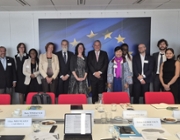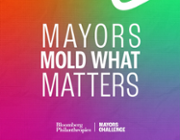CLGF-EU Agreement funds LED project in the Pacific
11 May 2022
Partnership is key to all development activities if we are to achieve the targets of the UN Sustainable Development Goals (SDGs). One important project in the Pacific on Local Economic Development (LED) has only been possible through such effective collaboration. The Framework Partnership Agreement between CLGF and the European Union has provided financial support, and the successful outputs achieved with the enthusiastic cooperation of the partners in this project - Nasinu, Nausori and Savusavu Town Councils, the Fiji Ministry of Local Government and Ministry of Economy, ICLEI Oceania and EAROPH Australia
Fiji is a Pacific Island archipelago made up of 332 islands covering 1.3 million km² of the South Pacific Ocean, with a total land area of 18,274 km². Its population is estimated at 945,000 with over 58% of the population residing in urban areas. Its economy relies heavily on tourism, sugar and agricultural exports, and remittances are an important source of household income. Fiji is vulnerable to natural disasters and the impacts of climate change, including tropical cyclones, flash floods, droughts, and rising sea levels.
Opportunities from an economic crisis
The economy has been impacted significantly from the impacts of the global COVID-19 pandemic, primarily a decline in tourism, which is the country’s primary industry. The impacts reverberate throughout the economy’s supply chains, government accounts, and business and consumer confidence. However, the current economic crisis also presents an opportunity for Fiji to diversify its economy, reduce excessive dependence on imports, improve food security and accelerate structural transformation.
This project, which is nearing its completion, looks to optimise these opportunities by building skills of the pilot municipal councils in understanding their local economies and identifying local economic development (LED) potential. The project is being carried out in two urban centres in Fiji – the fast-growing secondary urban centres of the Nasinu/Nausori corridor, located on the main island of Viti Levu and Savusavu on the on the south coast of Vanua Levu.
- is the second most populous municipality in Fiji with around 100,000 people. It is situated adjacent to the national capital Suva and houses a large majority of the work force of the area. Nausori is located adjacent and to the north of Nasinu and is home to some 60,000 residents. It provides essential services for the surrounding area as well as hosting several agricultural value add industries and the domestic and international airport serving the Suva corridor. Given the contiguous location Nasinu and Nausori Town Councils are undertaking joint activities under this project.
- has a population of around 7,000, having a blossoming tourist industry and niche industries focussing on the natural beauty and environmental diversity of the area. Savusavu’s location is ideal for showcasing investment in biodiversity to address the effects of climate change.
Each pilot Council has made a policy commitment, towards LED as a mechanism to improve livelihoods, aid economic recovery and achieve resiliency. They have also committed to developing tangible economic models to take forward this policy commitment.
Sustainable economic approaches to LED
The project aims to promote sustainable approaches to local economic development by empowering local government institutions to work with local businesses and key stakeholders to improve economic activity in a manner that addresses climate change and advances Fiji’s global climate and ocean commitments while also meeting the SDGs. It involved some formal training on understanding the local economy, data collection, LED processes, development of local LED plans, futureproofing and development of bankable projects.
Blue Town Master Plan
The project also takes forward the Savusavu Blue Town Master Plan. This is a multi-year strategy for the establishment of the first sustainable Blue Town that creates a thriving community that addresses climate change and ocean pollution head on while building livelihoods in a blue economy.
A key component of the project is implementing two demonstration projects that are informed by the LED strategies developed and can be used as examples to potentially attract private investors and/or external donor support. These projects will also be used as practical learning opportunities for the three municipal councils in project planning and implementation.
Reducing waste management costs
Nasinu/Nausori are developing a composting facility in an existing nursery. The Councils decided there is considerable potential to reduce costs of waste management by removing organic wastes from landfill, and this will provide additional environmental benefits as well as extending the life of the landfill infrastructure. Composting offers a potential to convert organic wastes into a product with economic value and this facility will have capacity for composting organic wastes from the various produce markets together with commercial food wastes, with compost for sale or for use in Councils’ landscaping programs.
As well as operationalising some components of the Blue Town Masterplan, Savusavu’s pilot project is to develop an eco-tourism project based on natural hot springs in the town. It is very unusual to find hot springs like this in the centre of any town, and they have long been a central landmark in Savusavu. The project involves improving the site, establishing a visitors’ educational centre and attractions, and training locals as guides. Another unique feature of this project is that It will retain access to the site for local people to use for cooking, as has been traditional practice. The next phase will be an integrated walkway to the ocean.
A devastating phenomena, this project has demonstrated how COVID-19 can be used to kick start economies and create new economic opportunities when partnership action is effectively deployed.
Back to News





